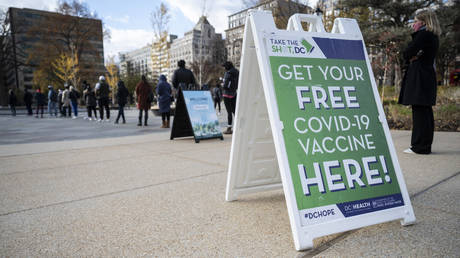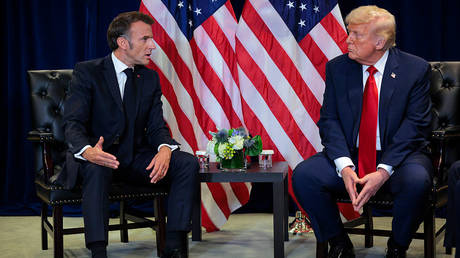
Congress was quick to agree on aid for Ukraine – which includes weapons for other US allies – but not on ending the pandemic
The US federal government has run out of money to cover the cost of Covid-19 testing and treatment for uninsured people. Along with this, vaccine administration for the uninsured will also end in a few weeks.
Since the Covid-19 pandemic is far from over and has been particularly bad in the United States already, the results of this will be disastrous. On March 15, the White House released a fact sheet warning about the implications of this funding deficit.
Among the key issues were the fact that it would be harder to identify emerging variants, scaling back of planned purchases of preventative treatments, and damage to global vaccination and treatment efforts.
As one of the few developed countries in the world that does not have universal health care, this essentially means that coverage for Covid-19, during an ongoing pandemic that has killed nearly 1 million Americans already, will be rationed based on wealth.
Starting March 28, hospitals and doctors’ offices won’t be reimbursed by the federal government for testing or treating uninsured patients for Covid-19. This means patients will be turned away if they don’t have the money in most cases unless providers decide to treat them for free or at a discount. In early April, the same will apply to those seeking vaccination.
Some states will retain an emergency Medicaid option that would allow free Covid-19 testing and treatment for the uninsured. However, the problem is that less than half of US states opted into the program – and most of the states not signed on happen to also mostly be poorer ones.
Prior to this funding disaster, the federal government had essentially been declaring victory on the pandemic. The CDC lifted its mask and other guidelines and also changed its definition of what high transmission means, which now reflects the degree to which Covid-19 outbreaks are straining hospital systems – not actual community transmission.
Likewise, the administration had been saying that the situation on the ground was changing because Covid-19 was no longer as deadly given the myriad treatment options and available vaccinations. Lack of access to these treatments immediately changes this calculus, making low household income another ‘at risk’ factor for the coronavirus.
This is, of course, an outcome Americans are famously used to. According to one highly cited study by the National Library of Medicine from 2008 during that era’s health care policy debate, about 26,000 Americans die every year from lack of health insurance. Another one in 2009 by the American Journal of Public Health found that this figure was about 45,000.
Medicaid expansion under the Affordable Care Act (ACA, often called ObamaCare) may have reduced these preventable deaths, but federal aid being pulled during the worst public health emergency in a century will see this number increase. There is zero doubt.
So why isn’t anyone doing anything about this? As tends to be the case, the answer is Congress. On March 2, the White House asked Congress for another $22.5 billion in funding for testing, vaccines, and treatments – but it has failed to pass anything on this issue even though there have been a few attempts. It seems Congress is happy to just pretend the pandemic is over and get on with life.
What’s also ironic about the White House’s funding request is that it also included a funding request for aid to Ukraine. The deadlocked Senate, which is split 50-50 for both parties and can’t even agree to reduce childhood poverty, the next week passed a $1.5 trillion government funding package that included $13.6 billion in aid to Ukraine – but nixed a reduced $15 billion in Covid-19 relief for Americans.
Note that this aid to Ukraine is split into ‘humanitarian’ and ‘lethal’. In addition to some $3 billion of this being spent on direct funding to the US military’s European Command, it will see an additional $3 billion allocated toward providing weapons to Ukraine and other US allies in Europe.
Arms lobbyists and their underlings in Congress and the Pentagon are scrambling now to unlock more funds for the military-industrial complex to pump out weapons to Europe, as Politico reported on March 22, including guaranteed contracts and a potential invocation of the Defense Production Act.
Likewise, the Pentagon is expected to roll out its budget proposal in the coming days which will list a few priorities, including hypersonic missiles, to reach parity with Russia after Russia’s self-reported usage of its Kinzhal hypersonic missile system in Ukraine. The cost to research, develop, test, and then fast-track this weapon system would be immense but is already being teed up in Congress.
This funding dilemma says a lot about Washington. Nearly 1,000 Americans are still dying from Covid-19 every day and the country’s combined death toll is nearing 1 million – but Congress doesn’t want to fund treatment and testing anymore. But when it comes to funneling weapons to Ukraine and developing weapon delivery systems for its great power rivalry with Russia, well, Congress has it covered and then some.




